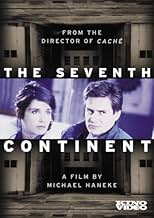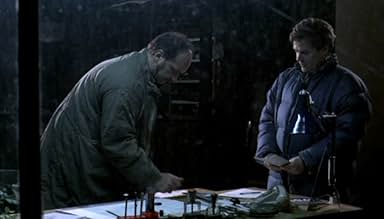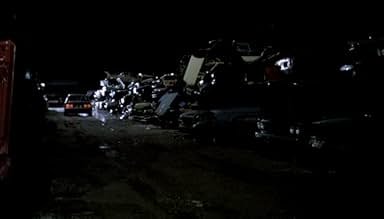IMDb RATING
7.6/10
18K
YOUR RATING
The daily routines of a seemingly ordinary Austrian family begin to take on a sinister complexion.The daily routines of a seemingly ordinary Austrian family begin to take on a sinister complexion.The daily routines of a seemingly ordinary Austrian family begin to take on a sinister complexion.
- Awards
- 2 wins & 1 nomination total
Jennifer Rush
- Self
- (archive footage)
- (uncredited)
- Director
- Writers
- All cast & crew
- Production, box office & more at IMDbPro
Featured reviews
Unnecessarily long and repetitive scenes intended to convey the boredom of the middle class Austrian family are undoubtedly a brilliant exhibition of cinematic art, but to me they only underline the totally unbelievable premise of the film. There was simply no reason for this family to be in despair: the man had a good white collar job and was recognized by his employer, the wife had a responsible entrepreneurial position and the daughter, while sometimes bizarre, was hardly a reason for her parents' perceived hopelessness. A man and a wife who are able to function effectively in every day life for the period of the film, three years, with no apparent psychoses, are not likely to engage in the incredible acts leading to the dramatic climax. The technical aspects of the film were interesting: short scenes, some without apparent relevance (the daughter's itch) with relatively long pauses between; the acting was a bit mechanical, sort of robotic, but that was undoubtedly intentional to convey the nihilistic mood of the protagonists. I didn't think the movie was worth watching, but most critics disagree, so if you enjoy this type of movie, then it is definitely for you.
I think that many people will be able to identify with this film. As always, I made a point of knowing virtually nothing about it before I saw it, and I'd recommend doing the same. If you know about the plot beforehand, the impact will be markedly ruined. The first thought that came to mind after the first few sequences was "they haven't shown anyone's face yet".. I guess that's the point. If you are reading this, then you most likely are not starving, and are amongst the rich 1 billion of the world. So the actions portrayed initially in this middle class existence needn't any face, as they pertain to all of us, we the regurgitators of human aspirations (weird phrasing). We don't have a face, as there is nothing to tell us apart from the next person. Anyway, it's absurd to think that the mental process that took over the family is considered an exception, but the fact that it is only highlights how sick our society is, refusing to remodel this cataclysmic and decerebrate way of being. I was affected by the subsequent events that transpired, and one particular scene still haunts me in a vicious way, although it cannot be mentioned here... suffice to say it broke free from a certain degree of apathy shown by the main characters throughout, revealing the desperate and twisted cry of raw emotion that can exude from even the most planned chaos. Watch it all the way through, it is meant to bore you for a while, it wouldn't be the same if it didn't.
Der Siebent Kontinent is a film you should watch. It is not pleasant neither does Michael Haneke uses any tricks in order to even interest you about the characters or their lives. Yet, it is as powerful as an atomic bomb during peace time. It is LOUD and its message (which is whatever you want it to be) is right in your face.
It is amazing how a masterpiece needs no soundtrack, fancy camera work or explicit and extended dialogs.
Unfortunately, it is very hard to find. The screenings are rare and no personal editions on VHS or DVD exist as far as I am aware. Many will recognize the "Piano Teacher" approach to directing but, this is as powerful as it can get. One of the finest examples of style not overlapping form.
Treat yourself with this lesson. Watch it if you can. Specially if you experienced depression at a given time in your life.
It is amazing how a masterpiece needs no soundtrack, fancy camera work or explicit and extended dialogs.
Unfortunately, it is very hard to find. The screenings are rare and no personal editions on VHS or DVD exist as far as I am aware. Many will recognize the "Piano Teacher" approach to directing but, this is as powerful as it can get. One of the finest examples of style not overlapping form.
Treat yourself with this lesson. Watch it if you can. Specially if you experienced depression at a given time in your life.
One of the most chilling movies I have ever seen, the idea for this film was reportedly sparked by real events in Austria. Similar to "Safe" in its depiction of modern anomie, but more powerful. The director is much more sympathetic to the characters than Todd Haynes was in his film.
A family, starved for attention and desperate to escape their daily life of abrasive routine, decide to turn things around one year and go against the routine. The film depicts their lives in three painful years of isolation, meaningless actions, and disillusionment. The first two-thirds of the film show the loud and hectic world that they are inexplicably a part of. Everything is just a series of actions. The semi-apocalyptic sequence shows a kind of desperate forcefulness of life that never breaks though, and the claustrophobic nature comes across as frighteningly unnerving. Tarkovsky would be proud.
The Seventh Continent was the second Michael Haneke film I had seen after The Piano Teacher. While I do not think that it is as honest a film as The Piano Teacher, I do applaud the fearless dynamic of the film to be completely devoid of style and of typical film conventions in order to depict a world that grows increasingly unpredictable and harrowing. The film is very Hitchcock-like in how it slowly and quietly builds it's themes involving desolate emotions. It is a tremendously scary film, but it is scary in a way that comes off a lot stronger after the film has finished and you allow it's images to swim around in your head for a while. The loss of passion and of feeling in a human being, to my knowledge, has never been depicted in such a pessimistic way.
This is a very angry film. This is a very resentful film. This is a film that celebrates sadness and anger and I hated watching it. When the film finds time to depict humanity, it writes it off like it is useless. What makes me even more angry about the film, in a way, is how you can almost feel Haneke behind the camera feeling resentful and wanting to punish the audience for wanting to view a film with a good story and a moving and engaging plot. Haneke goes so far out of his way to provide nothing in the way of narrative power and instead opts to craft an angry and traumatizing film. What makes the film work is it's power to provide some deeply haunting imagery and some truly worthwhile substance that I couldn't help but appreciate. Two of these three characters have complete control over everything that happens and they obviously feel that what they do in the final act of the film is most beneficial. Who am I to judge their own control over their lives. What pisses me off is how simple minded they are as characters. I just feel that Haneke prefers to emphasize these problems that these characters share, and what I am bothered by was that he didn't make it less obvious.
Overall, it's not one of Haneke's best films, but for a debut theatrical picture it is about as good as one can get. What strikes me as rather unusual about this film, when compared to his other films, is how it suffers from the same major problems that pretty much all of his films have. For example, he has never been able to build any sympathy with any of his characters, at least from the films of his that I've seen, and this film is no different in that regard. The film of his that I personally think suffers the most from it is Funny Games (both versions). With his picture Cache, it only became a problem early on in the film, and in Benny's Video and Hour of the Wolf it helped add to the atmosphere while damaging the humanity of the films in question. I think that The Seventh Continent shows plenty of promise with Haneke and is extremely riveting at times, but it's easily the absolute worst place to start if you are interested in getting into his films. It will not leave you with a good impression of his work, and only after watching Funny Games and Cache (his most easily accessible films in my opinion) will you be able to catch his reoccurring themes.
The Seventh Continent was the second Michael Haneke film I had seen after The Piano Teacher. While I do not think that it is as honest a film as The Piano Teacher, I do applaud the fearless dynamic of the film to be completely devoid of style and of typical film conventions in order to depict a world that grows increasingly unpredictable and harrowing. The film is very Hitchcock-like in how it slowly and quietly builds it's themes involving desolate emotions. It is a tremendously scary film, but it is scary in a way that comes off a lot stronger after the film has finished and you allow it's images to swim around in your head for a while. The loss of passion and of feeling in a human being, to my knowledge, has never been depicted in such a pessimistic way.
This is a very angry film. This is a very resentful film. This is a film that celebrates sadness and anger and I hated watching it. When the film finds time to depict humanity, it writes it off like it is useless. What makes me even more angry about the film, in a way, is how you can almost feel Haneke behind the camera feeling resentful and wanting to punish the audience for wanting to view a film with a good story and a moving and engaging plot. Haneke goes so far out of his way to provide nothing in the way of narrative power and instead opts to craft an angry and traumatizing film. What makes the film work is it's power to provide some deeply haunting imagery and some truly worthwhile substance that I couldn't help but appreciate. Two of these three characters have complete control over everything that happens and they obviously feel that what they do in the final act of the film is most beneficial. Who am I to judge their own control over their lives. What pisses me off is how simple minded they are as characters. I just feel that Haneke prefers to emphasize these problems that these characters share, and what I am bothered by was that he didn't make it less obvious.
Overall, it's not one of Haneke's best films, but for a debut theatrical picture it is about as good as one can get. What strikes me as rather unusual about this film, when compared to his other films, is how it suffers from the same major problems that pretty much all of his films have. For example, he has never been able to build any sympathy with any of his characters, at least from the films of his that I've seen, and this film is no different in that regard. The film of his that I personally think suffers the most from it is Funny Games (both versions). With his picture Cache, it only became a problem early on in the film, and in Benny's Video and Hour of the Wolf it helped add to the atmosphere while damaging the humanity of the films in question. I think that The Seventh Continent shows plenty of promise with Haneke and is extremely riveting at times, but it's easily the absolute worst place to start if you are interested in getting into his films. It will not leave you with a good impression of his work, and only after watching Funny Games and Cache (his most easily accessible films in my opinion) will you be able to catch his reoccurring themes.
Did you know
- TriviaBased on real events.
- Quotes
Georg Schober: We have to cancel the newspaper subscription
Anna Schober: Mhm
- ConnectionsFeatured in Selección TCM: Michael Haneke (2012)
- SoundtracksSend Me Roses
(uncredited)
Written by Günter Mokesch and Karin Raab
Performed by Günter Mokesch and Karin Raab
- How long is The Seventh Continent?Powered by Alexa
Details
- Release date
- Country of origin
- Languages
- Also known as
- The Seventh Continent
- Filming locations
- Production company
- See more company credits at IMDbPro
Box office
- Gross worldwide
- $428
Contribute to this page
Suggest an edit or add missing content


























